
This is repost from here.
By Benedict Vigers and Julie Ray
For the second straight year, about one in five Americans say they would like to leave the U.S. and move permanently to another country if they could. This heightened desire to migrate is driven primarily by younger women.
In 2025, 40% of women aged 15 to 44 say they would move abroad permanently if they had the opportunity. The current figure is four times higher than the 10% who shared this desire in 2014, when it was generally in line with other age and gender groups.
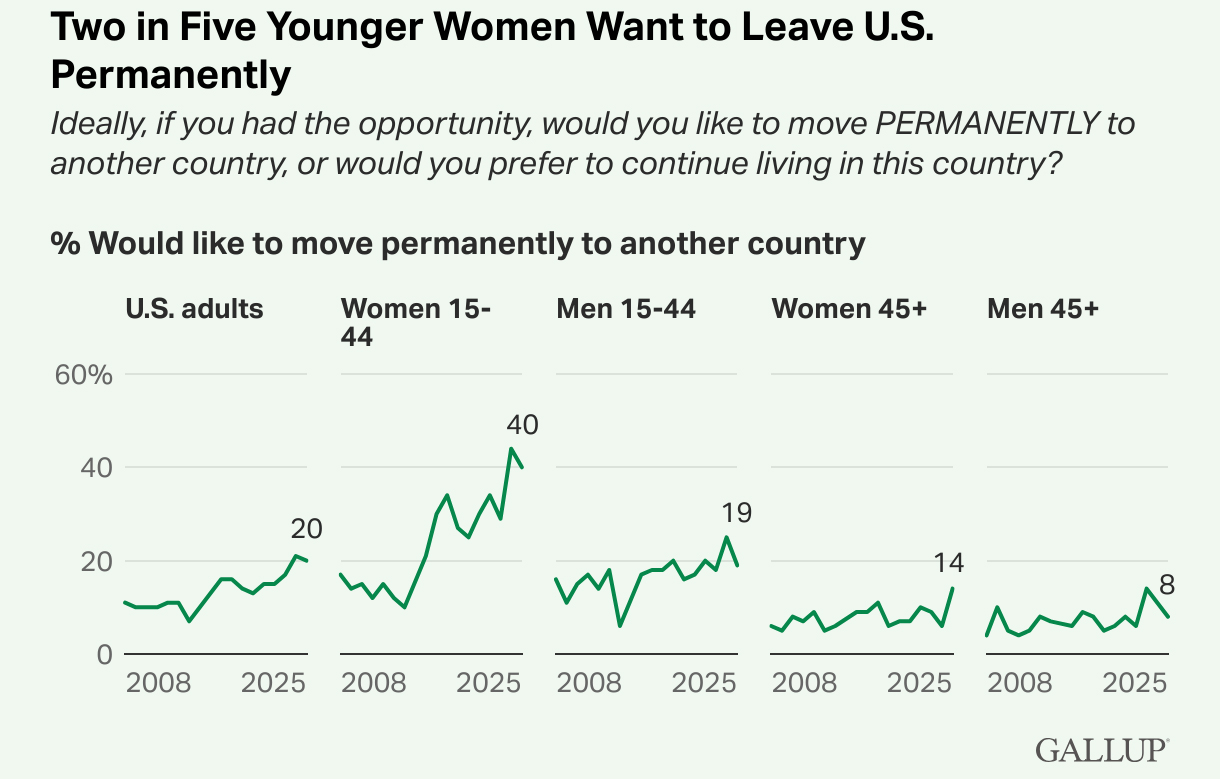
The percentage of younger women wanting to move to another country first rose decisively in 2016, the final year of President Barack Obama's second term. That year, Gallup surveyed the U.S. in June and July, after both parties’ presumptive nominees were set for the November election, which Donald Trump went on to win. Desire to migrate continued to climb afterward, hitting 44% in President Joe Biden’s last year in office and remaining near that level in 2025. This suggests a broader shift in opinion among younger women, rather than a solely partisan one.
The sharp rise in younger women wanting to leave the U.S. has created a large gender gap between them and their male counterparts. Today’s 21-percentage-point gap between younger men (19%) and women (40%) wanting to leave the U.S. is the widest Gallup has recorded on this trend.
Since Gallup began measuring this question globally in 2007, few countries have shown gender gaps this wide in the desire to migrate. Before the U.S. in 2025, no country had recorded a gap of 20 points or more between younger men and women.
Gallup’s question asks about desire to migrate, so these findings reflect aspirations rather than intentions. Previous Gallup research shows not everyone who wants to move will move. Still, the data indicate that millions of younger American women are increasingly imagining their futures elsewhere.
While the desire to move for good is currently elevated among U.S. men as well as women under age 45, it remains relatively flat at low levels among their counterparts aged 45 and older.
What has not changed is where these younger women would like to go. Canada remains the top preferred destination for younger American women looking to leave, with 11% of those in the years since 2022 mentioning Canada as their top destination, ahead of New Zealand, Italy and Japan (all 5%).
Young Women in Other Advanced Economies Don’t Share the Desire to Move
The growing trend in younger women in the U.S. looking to leave their country is not evident in other advanced economies. Across 38 member countries of the Organisation for Economic Co-operation and Development (OECD), the percentage of younger women who say they would like to migrate has held relatively steady for years, typically averaging between 20% and 30%.
For much of the late 2000s and early 2010s, younger U.S. women were less likely than their peers abroad to want to move. That changed around 2016. Since then, they have been more likely than younger women in other wealthy countries to say they would leave their homeland for good. By contrast, U.S. men aged 15 to 44 continue to be less likely than average to want to migrate compared with their peers in the OECD.
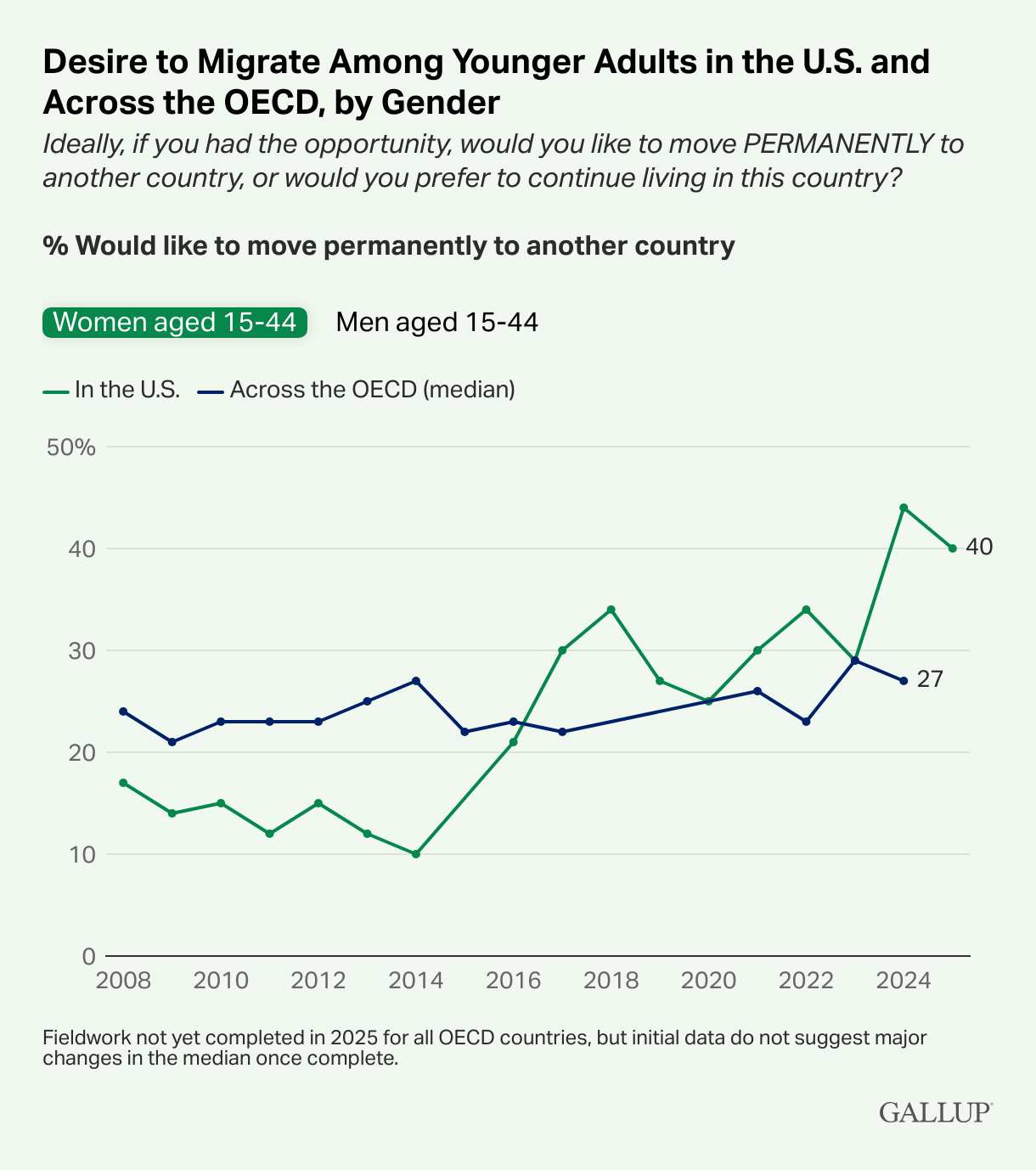
Politics Plays a Role Alongside Age and Gender
Rising interest in leaving the U.S. is shaped not only by age and gender but also by political attitudes. In 2025, there is a 25-point gap in the desire to migrate between Americans who approve and those who disapprove of the country’s leadership.
Desire to permanently leave the U.S. was not always such a politicized issue. Between 2008 and 2016, migration aspirations were similar regardless of views toward the country’s leadership. After Trump’s election, 2017 marked the first time this gap exceeded 10 points. During Trump’s first term, the difference in migration aspirations between those approving and disapproving of national leadership averaged 14 points. Under Biden, the gap narrowed to eight points, before climbing to 25 points in 2025, the first year of Trump’s second term in office.
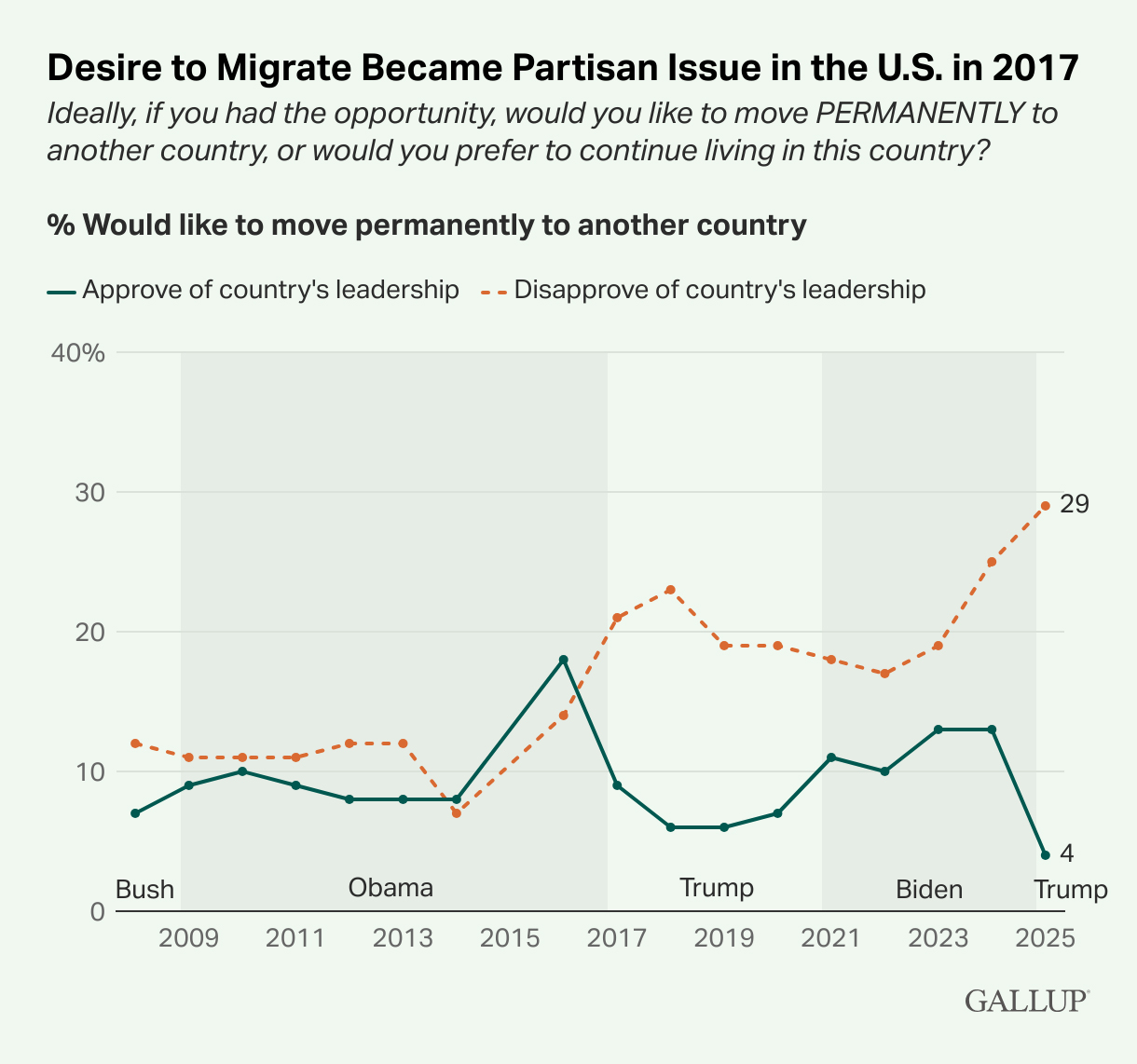
Younger women’s much stronger orientation to the Democratic Party than other age and gender groups exhibit helps explain some of the differences in desire to move abroad. So far in 2025, 59% of women aged 18 to 44 identify as or lean Democratic, compared with 39% of younger men, 53% of older women and 37% of older men.\
Desire to Migrate Rises Among Single and Married Women Alike
The people most likely to express a desire to migrate are typically those who have greater mobility, such as the unmarried, those without children at home and younger adults. However, among American women aged 18 to 44, the desire to migrate has risen regardless of marital status.
Between 2024 and 2025, at least two in five younger women — 41% of those who are married and 45% of those who are single — said they would like to move abroad permanently if given the chance. This is the narrowest gap by marital status among younger women in desire to move that Gallup has recorded since first asking the question, suggesting that younger married women increasingly do not view marriage as a barrier to migration.
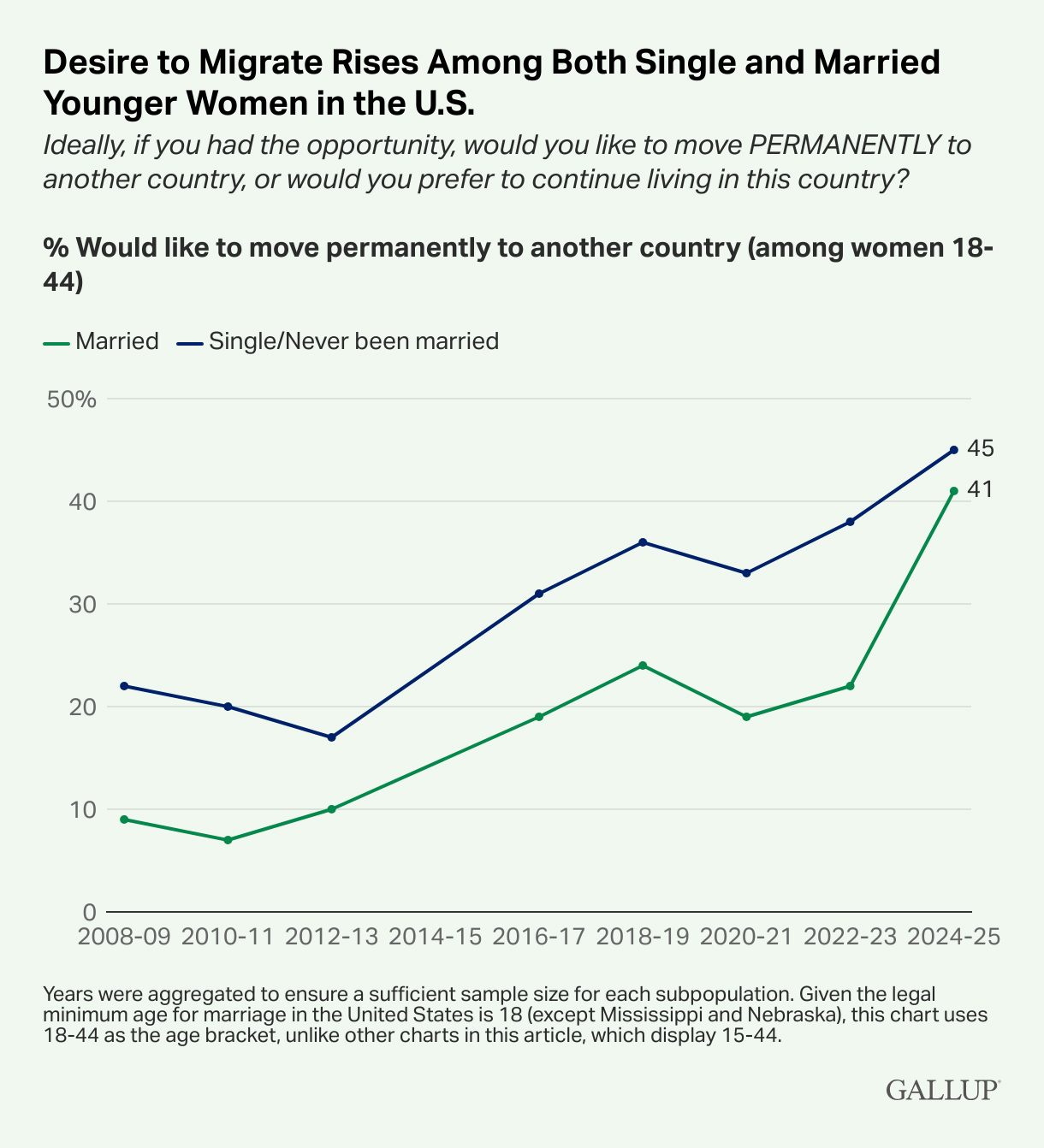
The same pattern is true for having young children at home. Among younger women with children living at home, 40% say they would like to leave the U.S. for good, on par with the percentage among those without children (44%). Were these women to follow through on their desire to migrate, it is likely that they would take the next generation with them.
Younger Women Lose Faith in America’s Institutions
Across demographic groups, Americans with lower confidence in institutions such as the government, judicial system, military and integrity of elections are consistently more likely to express a desire to leave the country.
Over the past decade, younger women have not only shown the largest increase in wanting to move abroad but also have experienced the steepest drop in institutional confidence of any age or gender group.
In 2015, women aged 15 to 44 scored an average of 57 on Gallup’s National Institutions Index, which measures confidence in the national government, military, judiciary and honesty of elections.
Since then, younger women’s scores have fallen by 17 points — a sharper decline than seen for any other demographic — and dropped during both the Trump and Biden administrations. By comparison, women aged 45 and older and men aged 15 to 44 have remained broadly stable in their confidence in institutions, while the score among men aged 45 and older has increased by 15 points.
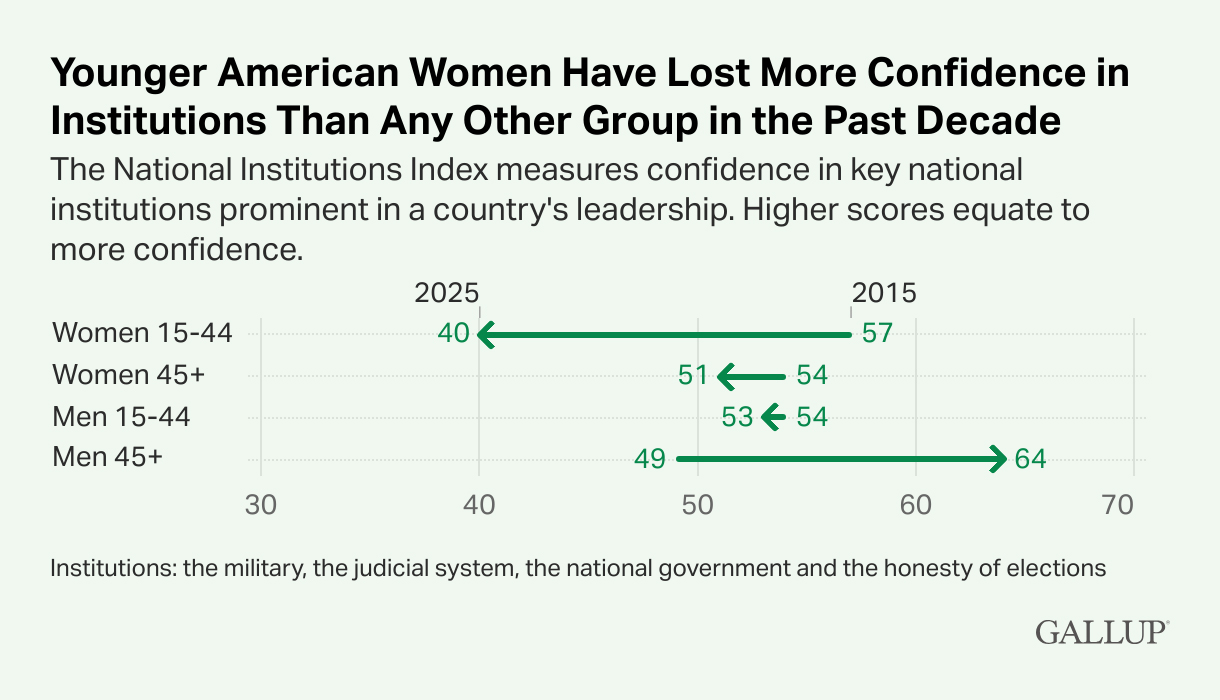
The Supreme Court’s 2022 Dobbs v. Jackson Women’s Health Organization decision, which overturned the constitutional right to abortion, may have contributed to the drop in younger women’s National Institutions Index score — particularly the steep decline in their confidence in the judicial system, which fell from 55% in 2015 to 32% in 2025, more than any other age group. However, when it comes to desire to migrate, the Dobbs decision alone may have played a more limited role, given that the trend in wanting to leave began years before the ruling.
Bottom Line
More Americans than at any time in the past two decades say they would like to move away from the U.S. permanently, with the sentiment becoming increasingly politicized since 2017. Younger American women’s desire to leave the U.S. has surged to unprecedented levels in recent years, widening the gender divide to more than 20 points, the widest recorded for any country in the World Poll.
Unlike their peers in other advanced economies, younger American women now stand apart from the rest of the U.S. in several respects. They increasingly lack faith in national institutions and picture their futures beyond America’s borders.
17 Comments
So, grumpy old men are happy that a grumpy old man is in charge ...
Others, not so much.
A parallel picture in NZ from consistent Roy Morgan polls since the last election: child bearing age women support Labour, all other demographics support the Coalition.
Women under 30 are incredibly left wing, 84% of women <30 voted for Momdani for example.
Let them leave and find their socialist nirvana. I find it curious that they openly welcome and support a religion that represents everything they seem to hate.
A species doesn't survive without its child-bearing females thriving. Maybe we should construct a world that works better for them?
Species survival is not the problem.
World population has trebled in my lifetime (from 1950s) & by a third since 2000. Primarily in countries riven by autocracy, religious intolerance and misogyny (incl barriers to female education & reproductive health). In the western world population growth is mostly a choice which is why natural increase is at a record low.
Many (eg PDK) would argue that the world has too many people for its resources.
Construct a world that works better for them, please describe what that looks like.
I tend to take a different view. There is a cohort of young women, often indoctrinated by left-leaning tertiary education institutions, that have been told they can have it all - careers, travel, family. However, that's not the reality for most. The reality is high rents, ever-rising cost of living, the reality of a long-hours corporate career not being as fulfilling as they thought and a shrinking pool of men that meet their criteria. Young women are militant around access to abortion yet actively support cultures that brutally suppress the rights of young women. I agree, these women postponing, or even giving up all together the desire for a family, is a crisis in the making for the West.
Young men, for all their faults, seem more capable of consistency when interpreting politics. And before anyone attacks me, my wife has become militant on this view, we discuss it with our daughter regularly (lol).
Te Kooti,
Other than your wife and daughter, are your views based on actual evidence, or just anecdotal?
There's this thing called artificial intelligence, if you paste my comment into it and push enter, it will find peer reviewed articles, statistics, research.
Does that answer your question, or were you trying to make a point (poorly)?
"...a shrinking pool of men that meet their criteria."
In a society where men and women are more equal, men will lose their attractiveness. In the past a subservient role was imposed upon women making men more manly and attractive. My own daughter's ambition is to become a housewife, however that is a "Remuera housewife" with a husband who is a doctor and owns an expensive house and nice cars. She's half way there as far as I can tell.
Men and Women have always been equal, where does more equal come from?
Women have been free to pursue whatever path they wanted my entire life. What has changed however, is that being a traditional housewife is now seen as a demeaning roll. I would happily swap my entire working life for that roll. There is nothing remotely satisfying about a corporate career that would see it is having greater value than being a mother.
This is what has changed. A career is a means to support your family, to think it has intrinsic value is fool's gold.
What has happened though, is bringing more women into the workforce has driven up house prices and now it's really a non-negotiable both parents have to work.
What planet have you been living on?
Women didn't get true financial independence in New Zealand until practically the 1980s.
Maybe you grew up around inbreds and red necks? My mother worked in the 70's and did very well.
No, I just asked A.I. to confirm what I already knew.
Come on man, a single woman could not get a mortgage in the old days. It wasn't a law it was just how society operated, including the banks.
Also, surely we can't judge history solely based on our own experience.
Can't really blame them given the demonstrated attitude of the current leadership towards women.
It's a shame the poll doesn't reveal which countries these young women would like to move to. I imagine the figures may be similar for Canada, NZ and Australia.
I'm treading on thin ice here but a society's loss of control over its young women must be a historical first and could have dire consequences. We probably have been facing dire consequences for some time already because of this.
It wasn't that long ago that women in Western countries had very limited access to employment and financial institutions. Men were recognised as the natural bread winners. This made men more attractive and family making more natural, or much more likely, for women. After all, with not much else to do, it's no surprise we had large, very large, families.
"What has not changed is where these younger women would like to go. Canada remains the top preferred destination for younger American women looking to leave, with 11% of those in the years since 2022 mentioning Canada as their top destination, ahead of New Zealand, Italy and Japan (all 5%).
I have to improve my speed reading skills! Canada doesn't sound very adventurous. I doubt they will enjoy Japan for very long and Italy is unlikely to be great long term. They're just dreamin'.

We welcome your comments below. If you are not already registered, please register to comment
Remember we welcome robust, respectful and insightful debate. We don't welcome abusive or defamatory comments and will de-register those repeatedly making such comments. Our current comment policy is here.